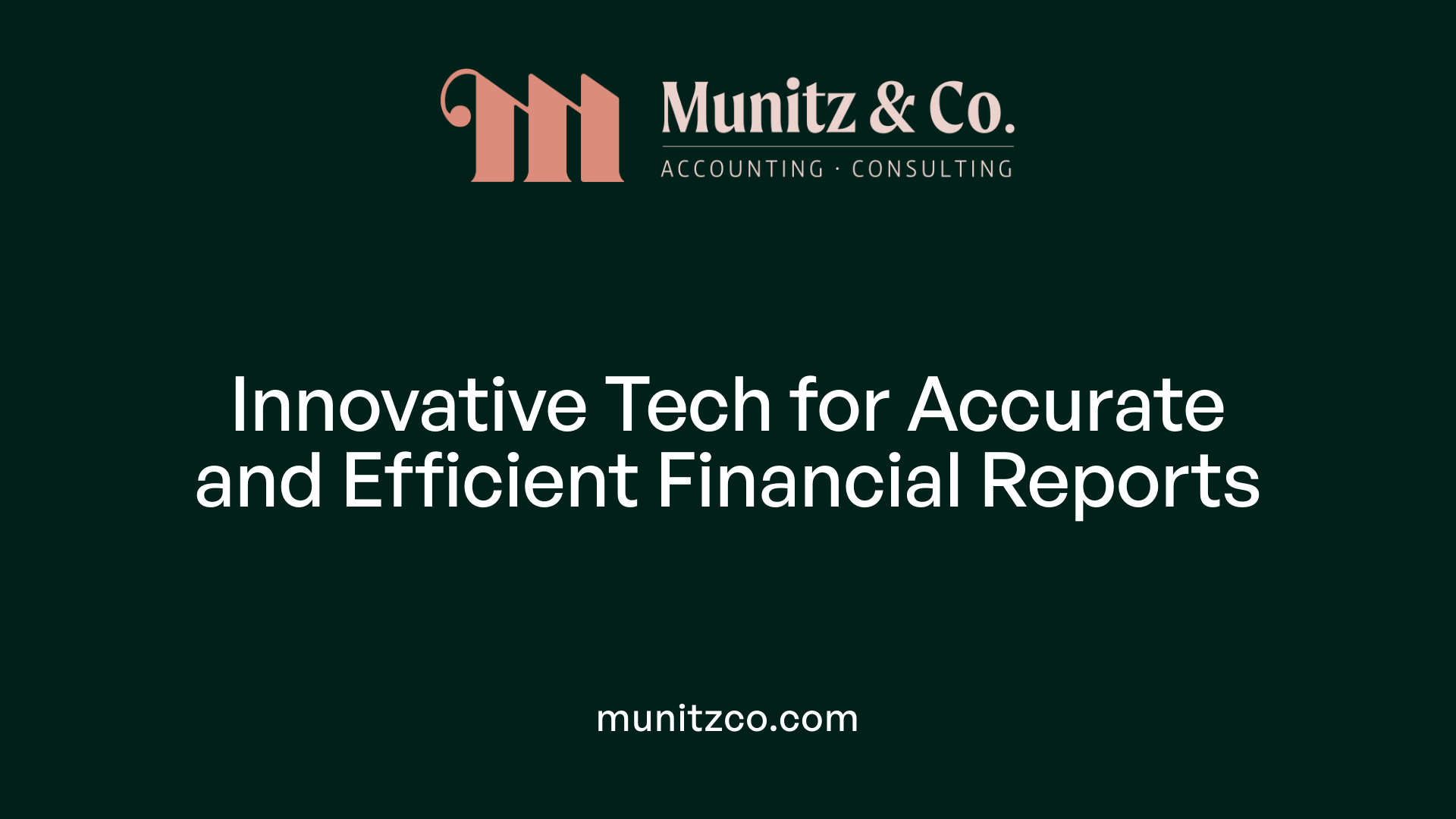The Backbone of Financial Assurance in Modern Firms
In today's rapidly evolving financial landscape, accounting and financial firms stand at the forefront of delivering trustworthy and insightful reporting. The increasing complexity of financial data and stricter regulatory demands call for systems that not only consolidate vast datasets but also ensure accuracy and compliance. This article explores how cutting-edge platforms and automated reporting tools are revolutionizing financial reporting, fostering confidence with every report delivered to stakeholders and decision-makers.
Comprehensive Services Driving Financial Clarity

What are the primary services offered by accounting financial firms?
Accounting financial firms, especially CPA firms, offer a broad array of core services designed to ensure accurate financial reporting and regulatory compliance. Their primary offerings include auditing to verify financial statements' truthfulness, tax preparation and planning to optimize client tax positions, as well as accounting, bookkeeping, and payroll management to maintain organized and compliant financial records.
Beyond these foundational services, many firms provide consulting and advisory support. This includes financial analysis and strategic planning aimed at improving clients' financial health and guiding operational decisions. Firms employ specialists such as auditors, tax experts, and IT professionals who bring expertise tailored to specific financial compliance and advisory needs.
Role of CPA firms
CPA firms serve as trusted financial partners who help clients meet complex regulatory requirements and achieve strategic goals. They facilitate clear financial communication through accurate reporting and help ensure organizations are audit-ready. Their advisory roles often extend into operational consulting, assisting businesses with compliance assurance and internal controls.
Expansion into emerging services
Reflecting evolving market demands, many accounting firms are expanding into emerging services. Virtual accounting enables remote financial management and reporting, increasing flexibility for clients. Fraud investigations have become a critical service area, responding to rising concerns about financial crime. Additionally, operational analysis helps companies optimize processes and identify efficiency gains.
Overall, accounting financial firms continue to evolve, delivering comprehensive solutions that blend traditional compliance focus with innovative services to drive financial clarity and strategic advantage for businesses and individuals alike.
Supporting Strategic Business Decisions with Trusted Data

How do accounting financial firms support businesses in financial decision-making?
Accounting financial firms play a crucial role in empowering businesses to make informed and strategic financial decisions. They provide reliable and precise financial data that serves as the foundation for thorough budgeting, forecasting, and cost analysis. With this reliable data, businesses can set achievable objectives and uncover new opportunities for growth.
Beyond just number crunching, these firms help ensure compliance with legal and regulatory frameworks, effectively minimizing risks related to legal penalties or fraudulent activities. Their expertise extends to tax planning strategies that optimize financial liabilities and enhance overall fiscal health.
Moreover, accounting firms act as trusted advisors in risk management, cash flow optimization, and investment decisions. Their guidance supports companies in adapting to changing market conditions with agility and confidence.
Financial decision-making support
Platforms like OneStream and Sage automate financial reporting and analysis, supplying real-time, accurate insights essential for sound decision-making. Features such as integrated dashboards, detailed reporting templates, and financial data quality controls eliminate discrepancies, fostering confidence in the data used.
Budgeting and forecasting
Automated tools assist in creating flexible and guided budgeting processes. By blending operational, financial, and transactional data, firms can produce comprehensive forecasts that align with organizational goals.
Risk management and compliance
Advanced financial software centralizes data while enforcing compliance controls and audit trails. This transparency helps prevent fraud and ensures adherence to regulatory standards, thus reducing exposure to risk.
Embracing automated financial reporting and advisory services, businesses gain enhanced productivity by shifting focus from manual data management to strategic analysis, enabling better responses to market dynamics and fostering sustainable growth.
Professional Expertise That Upholds Reporting Integrity

What qualifications and certifications do professionals at accounting financial firms typically hold?
Professionals in accounting and financial firms generally possess a blend of academic credentials, certifications, and ongoing training tailored to ensure accuracy and trustworthiness in financial reporting. A bachelor’s degree in accounting, finance, or related fields forms the essential foundation for their expertise.
Among certifications, the Certified Public Accountant (CPA) credential stands out as the most widely recognized and often mandatory, especially for audit and attest services. In addition to the CPA, specialists often hold other certifications such as Chartered Accountant (CA) for broader accounting mastery, Certified Management Accountant (CMA) focused on financial management, Certified Internal Auditor (CIA) for internal controls, Certified Fraud Examiner (CFE) for fraud detection, and Enrolled Agent (EA) for tax-related expertise.
Holding multiple certifications commonly enhances both skill sets and career prospects, with credentials like CPA and CMA linked to higher professional standing and salary potential.
Importance of CPA and other credentials
The CPA credential signifies a rigorous understanding of accounting principles, ethics, and regulatory compliance, which reinforces stakeholders’ confidence in financial disclosures. Other certifications complement this by offering specialized knowledge that supports distinct functions within an organization, from internal audit to fraud prevention and tax strategy.
Continuous professional development
Maintaining integrity and relevance in financial reporting requires professionals to engage in continuous education regarding evolving regulations, emerging technologies, and advanced financial tools. Proficiency with state-of-the-art software platforms—like OneStream, Sage’s portfolio, and automation tools such as Cube and Anaplan—is critical to delivering accurate, real-time insights and adhering to best practices.
Altogether, this combination of formal education, verified credentials, and ongoing professional development equips accounting professionals to uphold the highest standards of financial reporting integrity and to support strategic decision-making across organizations.
Harnessing Technology to Elevate Financial Reporting

How do accounting financial firms adapt to technological advancements in the industry?
Accounting firms are rapidly embracing technology to transform financial reporting and overall operations. Modern tools such as cloud computing and data analytics enable firms to access and process vast amounts of financial data efficiently and securely. Automation streamlines repetitive tasks like data entry, monthly closings, and reconciliations, significantly reducing human error and freeing staff to focus on analysis and strategic initiatives.
Artificial intelligence (AI) plays an increasingly pivotal role. Firms incorporate AI-based applications like ChatGPT and CoPilot to support decision-making and automate routine inquiries. Furthermore, blockchain technology offers enhanced transaction security and fraud prevention by providing transparent, tamper-resistant records.
To thrive in this evolving landscape, professionals develop new skills including prompt engineering to effectively interact with AI systems and integration expertise to ensure seamless interoperability between disparate financial software platforms.
Cybersecurity is paramount; firms adopt robust protective strategies such as data encryption, SOC compliance programs, and regular staff training to safeguard sensitive client data from increasingly sophisticated cyber threats.
This multifaceted technological embrace permits firms to optimize operations, deliver more insightful financial intelligence, and maintain a competitive edge in a dynamic financial services industry.
Ethical Foundations and Regulatory Compliance in Reporting
What are the ethical standards and regulations governing accounting financial firms?
Accounting financial firms adhere to stringent ethical standards primarily based on the Fundamental Principles outlined by the International Ethics Standards Board for Accountants (IESBA). These principles include:
- Integrity: Being honest and straightforward in all professional and business relationships.
- Objectivity: Avoiding bias, conflicts of interest, or undue influence from others.
- Professional Competence and Due Care: Maintaining professional knowledge and skill, acting diligently.
- Confidentiality: Respecting the confidentiality of information acquired.
- Professional Behavior: Complying with laws and regulations, avoiding actions that discredit the profession.
These ethical pillars ensure trust in financial reporting, fostering transparency and accountability in financial markets.
Regulatory Frameworks Supporting Ethical Conduct
Accounting firms are also governed by regulatory standards from authoritative bodies such as:
- Financial Accounting Standards Board (FASB): Establishes accounting standards in the U.S.
- International Financial Reporting Standards (IFRS): Offers globally recognized financial reporting guidelines.
- National Tax Authorities: Ensure compliance with tax laws and accurate reporting.
This regulatory backdrop promotes accuracy, transparency, and consistency in disclosures, reinforcing stakeholder confidence.
Importance of Transparency and Accountability
Ethical standards and regulatory compliance together aim to combat financial misreporting and prevent scandals that can undermine market stability. Transparent financial statements and adherence to regulations enable stakeholders—from investors to regulators—to make informed decisions. The emphasis on responsible and ethical decision-making maintains the integrity and credibility of accounting firms while upholding public trust in financial information.
| Ethical Standards | Regulatory Bodies | Impact on Reporting |
|---|---|---|
| Integrity | FASB | Builds reliable and honest financial disclosures |
| Objectivity | IFRS | Ensures unbiased and comparable reporting globally |
| Professional Competence | National Tax Authorities | Guarantees compliance and lawful financial management |
| Confidentiality | Protects sensitive information and maintains trust | |
| Professional Behavior | Upholds professional reputation and reduces misconduct |
Together, these elements form the ethical foundation critical to trustworthy, compliant financial reporting.
The Rise of Automated Financial Reporting Systems
Automation in financial reporting
Automated financial reporting systems streamline the entire reporting process by centralizing data and eliminating manual inputs. These advanced tools pull data automatically from various sources, including legacy accounting systems, to produce real-time, accurate financial statements such as balance sheets, income statements, and cash flow statements. This automation accelerates report generation, reduces errors, and enhances auditability, ensuring transparency and compliance throughout the reporting cycle.
Benefits of automated reporting tools
The primary benefits of implementing automated financial reporting include improved accuracy, increased efficiency, and enhanced collaboration. By minimizing human error associated with manual data handling, these systems deliver precise and timely reports tailored to stakeholder needs. Automation frees FP&A teams from repetitive tasks like account reconciliation and monthly closes, allowing them to invest more time in in-depth analysis and strategic planning. Furthermore, features like customizable dashboards and interactive visualizations provide deeper insights for better decision-making, supporting agile business responsiveness.
Integration with existing financial systems
Automated reporting solutions seamlessly integrate with existing enterprise tools such as ERP, FP&A software, and data management platforms. This interoperability enables smooth data capture, validation, and processing across multiple sources, creating a unified financial ecosystem. Popular ERP systems like Microsoft Dynamics 365, QuickBooks Enterprise, and Sage 300 often serve as foundational platforms within automated workflows. Additionally, integration extends to FP&A tools like Cube, Datarails, Anaplan, and Vena, enhancing reporting scalability and flexibility without disrupting established processes.
Key Features of Leading Financial Reporting Platforms
What are the main capabilities of the OneStream platform?
OneStream offers a unified platform designed to break down data silos and provide real-time financial insights. Its built-in financial intelligence and data quality controls ensure accuracy and regulatory compliance, enhancing confidence in decision-making. Users benefit from Excel integration, interactive dashboards, and the ability to blend financial, operational, and transactional data for comprehensive analysis. The platform also provides over 100 pre-built reports and supports guided reporting for tailored analytics creation. Its versatile solutions cover financial close and consolidation, data quality management, ESG reporting and planning, as well as account reconciliations.
How does Sage's financial reporting software support organizations?
Sage delivers automated financial reporting tools that centralize financial data and streamline reporting workflows. These solutions enable collaboration across teams by integrating seamlessly with existing systems. The software increases efficiency and accuracy by offering timely, precise financial information customized to stakeholder requirements. Sage's products, including Sage Intacct, Sage X3, Sage 100, and Sage 50, cater to different business sizes and are notable for rapid payback and improved productivity. Their customizable data insights, automated precision, visual dashboards, and secure collaboration features empower strategic financial management and market responsiveness.
What role do real-time insights and dashboards play in these platforms?
Both OneStream and Sage emphasize real-time data integration to provide up-to-date financial reports and visualizations. Interactive dashboards simplify complex data, enabling quick and informed decision-making. These features eliminate manual data entry and lower the risk of errors, fostering transparency and auditability. Real-time reporting also facilitates faster financial closes and supports compliance efforts. The tools’ scalability and compatibility with other financial systems ensure they can adapt to evolving business needs, making continuous financial monitoring accessible and efficient.
Enhanced Confidence through Accuracy and Collaboration
How Does Data Quality Control and Compliance Enhance Financial Reporting?
Reliable data quality controls are essential to producing accurate financial reports that stakeholders can trust. Platforms like OneStream integrate built-in financial intelligence with stringent data quality controls, ensuring that every figure is precise and compliant with regulatory standards. This accuracy reduces the risk of errors and non-compliance, reinforcing confidence throughout the decision-making process.
What Role Does Collaborative Financial Management Play in Modern Reporting?
Collaboration across departments is vital for a comprehensive understanding of financial health. Sage’s automated reporting solutions enable seamless integration across various systems, encouraging teamwork and data sharing. This collaborative environment facilitates more informed insights and allows teams to dynamically adapt reports based on collective input, improving strategic financial management.
How Do Modern Systems Prevent Fraud and Increase Transparency?
Automated financial reporting tools maintain transaction records and changes, creating a transparent audit trail. This traceability helps detect and prevent fraudulent activities by ensuring all modifications are logged and reviewable. By minimizing manual interventions, these systems reduce potential manipulation, enhancing the integrity and reliability of financial reports.
| Aspect | Description | Impact on Financial Reporting |
|---|---|---|
| Data Quality Controls | Built-in checks and compliance mechanisms in platforms like OneStream | Ensures accuracy and adherence to financial regulations |
| Collaborative Management | Seamless integration across departments via Sage solutions | Fosters teamwork and comprehensive, real-time financial insights |
| Fraud Prevention & Transparency | Automated logging of transactions and changes | Enhances auditability and reduces risk of manipulation |
Together, these features create a robust framework for financial reporting that builds stakeholder trust through accuracy, collaboration, and accountability.
Building Confidence with Every Financial Report
The integrity and reliability of financial reporting form the cornerstone of stakeholder trust and strategic business success. By combining the expertise of qualified professionals with cutting-edge technologies like those offered by OneStream and Sage, accounting financial firms are transforming how financial data is consolidated, analyzed, and reported. Automated systems not only enhance accuracy and compliance but also free professionals to focus on higher-value analysis and strategic advising. Upholding rigorous ethical standards alongside technological advancements ensures transparency and security. As financial ecosystems continue to evolve, these systems that deliver confidence with every report will remain essential, empowering businesses to navigate complexities with assurance and insight.
References
- Unlock Financial Clarity with Unified Reporting & Analytics
- Financial Reporting Software for Business | Sage US
- Automated financial reporting: What FP&A leaders need to ...
- What services are provided by certified public accountant firms?
- Accountants and Auditors : Occupational Outlook Handbook
- Top Accountant Skills
- Top 8 Certifications for Accountants To Consider
- Everything you need to know about professional accounting ...
- How Technology is Transforming the Accounting Profession







